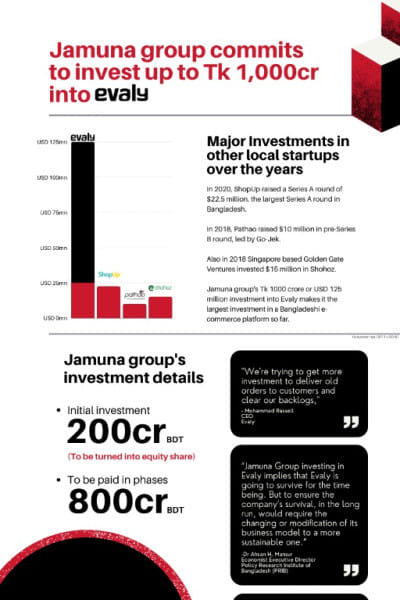Jamuna’s investment in Evaly: What does it actually mean?

Since yesterday, one of the most talked-about topics in Bangladeshi social media is industrial conglomerate Jamuna Group's announcement of investing up to Tk 1,000 crore in the e-commerce platform Evaly. The sheer size of the figure astounded many as it is the largest amount of investment the country has ever seen in its e-commerce industry. Initially, Jamuna Group will invest Tk 200 crore, and the rest in phases.
The announcement comes when Evaly has been facing the most turbulent of times, dealing with continuous backlashes, suspension threats and probes regarding its alleged unethical business operations model. Several agencies, including the Anti-Corruption Commission and the Crime Investigation Department, CID, of Bangladesh Police, have been carrying out investigations into alleged embezzlement of Tk 338.62 crore by Evaly. Major banks and mobile financial institutions have blacklisted the e-commerce platform and e-Commerce Association of Bangladesh, e-CAB is considering suspending Evaly's membership.

What does this investment actually mean?
Although the new investment is regarded on a positive note by many, notably by Evaly's CEO Mohammad Rassel who celebrated the news with an ecstatic status on Facebook. But a closer look into the picture might tell a different story.
According to several industry experts, out of several types of investments in startups, the most common three forms are equity, loans and convertible debt. Equity investment is where a business takes a percentage of shares or equity then and there. In the case of loans, investment is raised usually from a lender i.e. banks or financial institutions like any other loan. In the case of convertible debts, a business borrows money from an investor where both parties enter the agreement with the intent to repay all or part of the debt by converting it into shares at some point in the future. Experts opine that the latter might be the case of Evaly's investment.
It is already known that Evaly and Jamuna both had been in business for a while now prior to this investment. The nature of the deals and exact figures are not available but according to the comments of high officials to several media outlets, it is known for a fact that Jamuna has already sold products through Evaly, for which payments are still pending. So the initial investment by Jamuna of Tk. 200 Crore does not necessarily constitute a direct cash injection to the company. The exact equity to be held by Jamuna was also not fixed as mentioned by the top brasses of Evaly and Jamuna.
One prominent VC, requesting anonymity, said that this was a move to uplift the image of the cash strapped e-commerce as the new regulations imposed by the government does not allow advance payment which was 'critical' for the business to run the operation smoothly. He however said that this was a bold move by both parties and has been able to generate local and international attention, "This will probably help them (Evaly) stabilise the business a bit as it will increase seller and buyer trust as well as make it more investment-worthy."
But will it make the e-commerce venture sustainable? "Jamuna Group investing in Evaly implies that Evaly is going to survive for the time being. But to ensure the company's survival, in the long run, would require the changing or modification of its business model to a more sustainable one," said Dr Ahsan H. Mansur, Economist and Executive Director, Policy Research Institute of Bangladesh (PRIB).
Muhammad Abdul Wahed Tomal, General Secretary of e-CAB, says it's not clear yet whether this investment will turn things around for Evaly. "We, at e-CAB, are yet to assess the situation. We want to probe further into this news and want to know very clearly how this investment will be poured, how it will be utilised and exactly how Evaly will bring changes to its business model."
So, it seems, the e-commerce venture might survive for the time being. But would they be able to survive in the long run and be a sustainable venture by improving their finances and practises? That remains unanswered for now.



 For all latest news, follow The Daily Star's Google News channel.
For all latest news, follow The Daily Star's Google News channel. 



Comments